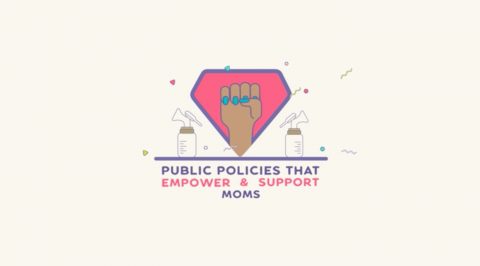
It’s National Breastfeeding Month and today, August 25th, kicks off Black Breastfeeding Week. It is a time for celebration, as well as an important moment to take stock of what work still needs to be done to ensure that more moms, particularly moms of color, are able to meet their breastfeeding goals.
Let’s take a good look at the state of breastfeeding across the country. The reality is that while the majority of moms start out breastfeeding, many women stop breastfeeding sooner than they’d like and struggle to meet their breastfeeding goals.
<
Here’s the deal: While 4 out of 5 U.S. mothers start out breastfeeding,less than half are still breastfeeding at 6 months postpartum. Moms of color struggle even more. Breastfeeding initiation rates for for African American moms are significantly lower than breastfeeding rates for other moms in almost half of the country and the disparity widens to by 25% in 7 states.
Why are so many women falling short of meeting their personal breastfeeding goals and recommendations of public health professionals? There are a number of reasons and we’re going to focus on three right now:
- Lack of access to paid family and medical leave
- Lack of lactation support and education
- Lack of workplace accommodations
If you take a step back and think about how the United States is one of the few countries in the world without paid family and medical leave, the drop in breastfeeding rates starts to make more sense. Right now, one out of four women is back at work within two weeks of giving birth because they cannot afford to take any additional unpaid time away. As a result, new moms are back at work before they’ve been able to recover from giving birth and before they’ve been able to establish breastfeeding routines.
When encountering difficulties breastfeeding, many moms may seek support and guidance from lactation professionals, but for low-income women these supports are often inaccessible and unaffordable, even with limited healthcare coverage. not to mention that the Congress’ constant back and forth about healthcare coverage leaves a question as to whether coverage is at risk.
Finally, when they are back at work, breastfeeding mothers often face another set of challenges: lack of clean and private spaces to express breast milk and inadequate places to store that liquid gold. The Affordable Care Act requires some employers to provide hourly wage-earning and some salaried employees (nonexempt workers) with “reasonable break time” and a private, non-bathroom place to express breast milk during the workday, up until the child’s first birthday. While this protects and supports the most vulnerable of workers, this distinction in the law unintentionally excludes “exempt” or salaried employees, causing significant confusion. In fact, right now 60% of working moms in the United States find themselves pumping in inadequate and even unsanitary places on the job.
What is worse, black mothers have reported greater barriers to breastfeeding compared to other groups, including lack of access to breastfeeding advice and support, discomfort in breastfeeding in public and concerns about lack of paid leave and workplace pumping accommodations.
These barriers contribute to increasing health disparities leaving communities of color particularly vulnerable. It leaves black and hispanic children at a greater risk for childhood disease and the inability to exclusively breastfeed for the recommended six months has been attributed to twice as many deaths and three times as many in childhood diseases in black infants.
The good news is there is a solution! There are public policies that can help break down these barriers and empower moms to meet their breastfeeding goals. Public policy solutions like paid family and medical leave, ensuring that all moms have access to lactation support, education and supplies and workplace accommodations to express breastmilk. Enacting a comprehensive paid family and medical leave policy will ensure that moms, babies, and partners have the opportunity to heal, bond and set them off on a great start in their breastfeeding journey. Making sure that when breastfeeding moms encounter difficulties, they have access to lactation support, education and supplies is key to breastfeeding success. Once she returns to work we want to ensure that she has adequate break time and a private space to pump so that she can continue to breastfeed.
Breastfeeding isn’t just good for moms and babies, it’s also good for the economy! Recent studies have shown if mothers could meet current medical recommendations for breastfeeding it would save the US economy nearly $13 billion per year in paediatric health costs and premature deaths. And when ¾ of the moms are primary or co-breadwinners, we must close the gap in existing laws and expand protections for all breastfeeding mothers.
Together we can overcome many barriers to breastfeeding!



The views and opinions expressed in this post are those of the author(s) and do not necessarily reflect those of MomsRising.org.
MomsRising.org strongly encourages our readers to post comments in response to blog posts. We value diversity of opinions and perspectives. Our goals for this space are to be educational, thought-provoking, and respectful. So we actively moderate comments and we reserve the right to edit or remove comments that undermine these goals. Thanks!